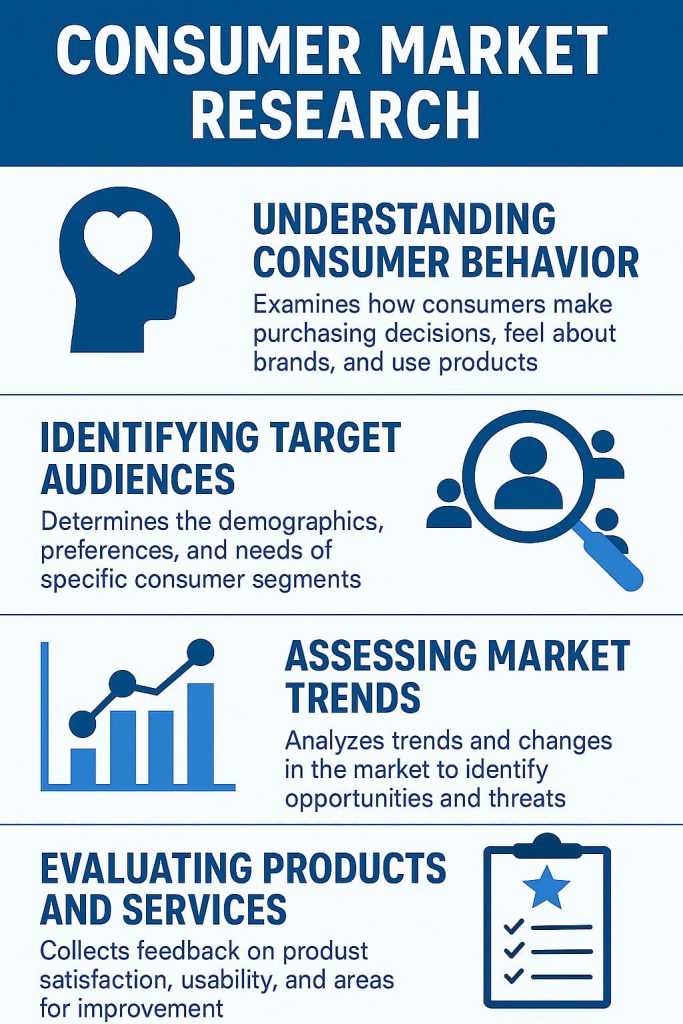Consumer Market Research Services for Smarter Business Decisions

With consumer market research, you can figure out the latest market trends and adapt your company’s products to meet your audience’s needs.
You can’t make your business stand out and thrive using dry data sets.
No.
What you need is accurate market research reports that will help the relevant stakeholders make informed decisions. Only this way can you fulfill consumer expectations and demands.
Collaborating with SIS International allows your company to enjoy our data-driven consumer market research services and valuable insights. It will help your business grow, adapt, and maximize its revenue in the long term.
… But before that, let’s see what consumer market research actually is.
Table of Contents
✅ Listen to this PODCAST EPISODE here:
What Is Consumer Market Research?
Consumer market research aims to analyze companies’ target consumers. It’s the art and science of understanding consumers’ preferences, motivations, behaviors, and buying patterns. This research often employs qualitative methods (like focus groups or one-on-one interviews) and quantitative methods (like surveys or data analytics).
At its core, it offers insights into what consumers think about a product or service, their experience, and how they perceive its value. It also delves into their lifestyle, cultural influences, and even psychological triggers influencing their purchase decisions. Without this in-depth understanding, businesses might be shooting in the dark, hoping their products or campaigns resonate with an audience they don’t fully comprehend.
Moreover, consumer market research is not static. Consumer preferences evolve, new trends emerge, and market dynamics shift. To keep pace, businesses must continuously update their understanding of the market landscape.
Why is Consumer Market Research Important for Modern Businesses?

Consumer market research is vital for businesses aiming to understand and meet their target audience’s evolving needs and preferences. It provides valuable insights into consumer behavior, purchasing patterns, and trends, allowing businesses to tailor their products and services accordingly.
Furthermore, staying ahead in a competitive marketplace requires a deep understanding of the target market. Consumer market research helps businesses identify emerging trends and opportunities, enabling them to innovate and differentiate their offerings.
Additionally, with consumer expectations constantly changing, businesses must adapt to stay relevant. Consumer market research gives businesses the necessary data to make informed product development and positioning decisions.

Who Needs Consumer Market Research Solutions?
✔️ Companies across industries rely on consumer market research to identify market opportunities, assess the competitive landscape, and refine their product offerings to better meet consumer needs and preferences.
✔️ Marketing teams within these companies use consumer market research to segment their target market, develop targeted messaging, and determine the most effective channels to reach their audience.
✔️ Product development teams leverage consumer market research to identify gaps in the market, gather feedback on existing products, and develop new products that address consumer needs.
✔️ Sales teams use consumer market research to understand consumer buying behavior, identify potential customers, and tailor their sales approach to meet the needs of different consumer segments.
✔️ Retailers use consumer market research to understand shopping habits, preferences, and trends. This enables them to optimize their product assortment, pricing strategy, and store layout. Retailers can create a more personalized shopping experience by analyzing consumer data, driving customer loyalty and repeat purchases.
✔️ Investors use consumer market research to assess market trends, evaluate the potential success of new ventures, and make informed investment decisions. By understanding consumer preferences and market dynamics, investors can identify lucrative investment opportunities and mitigate risks.
Key Components That Make Consumer Market Research Successful

Achieving meaningful results from consumer market research requires careful planning and execution. Here are some critical success factors to consider:
- Quality Data Collection: The quality of data collected significantly impacts the validity and reliability of research findings. Employing rigorous data collection methods, such as surveys, interviews, and focus groups, and ensuring representative sample sizes are critical for obtaining accurate insights into consumer behaviors and attitudes.
- Effective Analysis: Analyzing research data effectively requires robust analytical techniques and tools. Whether quantitative analysis using statistical methods or qualitative analysis using thematic coding, applying appropriate analytical approaches helps uncover meaningful patterns, trends, and correlations in the data.
- Actionable Insights: The ultimate goal of consumer market research is to generate actionable insights that drive business decisions. Presenting research findings, concisely, and actionable, accompanied by recommendations and implications for decision-making, empowers stakeholders to take informed actions based on research insights.
- Continuous Learning: Consumer preferences and market dynamics evolve over time, requiring businesses to continuously monitor and adapt their research strategies. Embracing a culture of constant learning and iteration and leveraging feedback from research findings to refine strategies and approaches ensures research efforts remain relevant and impactful in an ever-changing market environment.
Table 1. Consumer Market Research: Industry Data & Strategic Insights
Consumer Market Research: Industry Data & Strategic Insights
| Research Category | Key Industry Data | Strategic Impact | Source |
|---|---|---|---|
| Market Size Growth | $130B to $142B industry growth (2022-2023) | 9.2% year-over-year expansion | ESOMAR Global Report 2024 |
| Consumer Confidence | Consumer Confidence Index rose 12.3 points to 98.0 in May 2025 | Strong economic sentiment | Conference Board May 2025 |
| Gen Z Economic Impact | $8.9T added to global economy by 2035, spending grows 2x faster | Critical demographic shift | McKinsey State of Consumer 2025 |
| AI Adoption in Research | 89% of researchers using AI tools regularly or experimenting | Technology transformation | Qualtrics Market Research Trends |
| Social Media Research | 32% of consumers use social media for product research (up from 27%) | Digital-first behavior | McKinsey Consumer Survey 2025 |
| Research ROI Challenge | 61% of senior marketers struggle to prove marketing ROI | Measurement opportunity | Duke University CMO Survey |
| Trade-Down Behavior | 75% of consumers traded down in Q1 2025 due to price sensitivity | Value-focused decisions | McKinsey US Consumer Q1 2025 |
| Food Delivery Growth | Share of global food service spending: 9% (2019) to 21% (2024) | Convenience demand surge | Euromonitor International 2025 |
| Qualitative Research Demand | 74% of AI-using researchers see increased demand for qualitative studies | Human insight value | Qualtrics Research Trends 2024 |
| Financial Well-being Index | Global index at 100.8 in April 2025, down from prior year | Economic sentiment shift | Deloitte ConsumerSignals |
| Baby Boomer Digital Shift | Growing video app usage, 13% increase in influencer following (2020-2023) | Cross-generational digital | GWI Consumer Trends 2025 |
| Research Professional Security | 92% of market research professionals feel secure in their roles | Industry stability | Industry Professional Survey |
| Price Concern Dominance | 43% of US consumers cite rising prices as top concern | Value proposition focus | McKinsey ConsumerWise 2025 |
| AI Response Authenticity | 49% of researchers concerned about distinguishing real vs AI responses | Quality control challenge | Qualtrics AI Research Report |
| Spending Intent Recovery | 38% expect finances to improve within next year (down from 41%) | Cautious optimism | Deloitte Financial Well-being |
| Campaign Research Impact | 5% improvement in strategic direction significantly impacts ROI on millions spent | Research optimization value | Marketing Effectiveness Research |
| Gen Z Income Growth | Average 25-year-old Gen Z has $40K income, 50% higher than Boomers at same age | Generational wealth shift | GfK, NielsenIQ, World Data Lab |
| Purchase Planning Increase | Significant increases in home, car, and vacation purchase intentions after May 2025 | Economic confidence boost | Conference Board Consumer Survey |
What Can Businesses Expect from SIS International’s Consumer Market Research Services?
SIS delivers actionable insights and tangible results to businesses seeking to understand their target audience and market dynamics. Here are the expected results businesses can anticipate from SIS International’s consumer market research services:
- Comprehensive Insights: SIS International conducts in-depth research to provide businesses with extensive insights into consumer preferences, behaviors, and trends. We deliver a holistic understanding of the target market and key drivers influencing consumer decisions.
- Strategic Recommendations: SIS offers recommendations tailored to the business’s objectives and market context. We provide actionable insights that inform strategic decision-making and drive business success.
- Competitive Intelligence: We help businesses gain a competitive edge by providing insights into competitor activities, market positioning, and emerging trends.
- Market Validation: Before launching new products or entering new markets, businesses can rely on SIS International’s market validation services to assess market demand, viability, and potential barriers to entry.
- Customer Segmentation: SIS International helps businesses segment their target audience based on demographic, psychographic, and behavioral attributes.
- Measurable Impact: Our experts are committed to delivering measurable impact and tangible outcomes for their clients. Through rigorous performance tracking, monitoring, and evaluation, SIS International ensures that its consumer market research services drive value in terms of revenue growth, market share expansion, and competitive differentiation.

How Do We Collect Data to Deliver Accurate Consumer Market Research Reports and Insights?
Consumer Market Research can help these businesses by uncovering the needs of a prospective target market. Companies can use market research to test opinions, attitudes, usage, and behaviors.
They can also use it to gain insight into the competition or new opportunities. Market research helps firms to gauge the thought processes of the consumer. Analysts use several methods, including the following:
- Focus Groups: Researchers can conduct focus groups as qualitative research. They gather a group of people and ask them about their attitudes toward a product, concept, or idea. The focus group format has several advantages. It’s a low-cost method, and candidates are likelier to be forthright. It is handy for project evaluation and needs assessment purposes.
- In-depth or one-on-one interviews: Market researchers use this tool to collect data from consumers of rival products, when their client needs an expert opinion, when gauging high-level executives, business owners, and critical opinion influencers, and for community leaders, specialists, and technicians. In-depth interviews help gain insights from experts on any delicate topic.
- Online Video Interviews: Researchers can now use FaceTime, Skype, and similar platforms to interview participants. Video interviewing offers a real-time connection. It is cost-effective. Thus, researchers can increase the variety of samples. Online interviews work well as a complement to face-to-face interviews.
- Telephone Interviews: As their name suggests, researchers conduct telephone interviews over the phone. They can use them as in-depth interviews using a topic guide. Researchers also use telephone interviews for quantitative research. They can conduct the interviews via a CATI (Computer Aided Telephone Interviewing) system. This method allows the researcher to upload responses right away for analysis.
- Online Surveys: Researchers favor this method for many reasons. It’s easy to profile prospective respondents to ensure they’re right for the survey. It’s also cost-effective. Researchers can cross-link the information received with qualitative data. Online surveys also make it easy to interview hard-to-reach respondents.
How We Help Businesses Make Consumer-centric, Data-driven Decisions
Since 1984, we’ve specialized in essential areas of consumer products, electronics, energy, cosmetics, pharma, automotive, travel, and more. Through advanced Global Market Research, our business allows companies to connect with and retain their target customers.
We understand that navigating the contemporary business landscape is complex. Our sophisticated research methodologies, data and intelligence analysis, and unparalleled insight into ever-changing markets, cultures, and consumer mindsets, can make a difference for your company and position you well to succeed in this new and challenging era.
Technological advancements and changing customer demands have required businesses around the globe to evolve instantaneously to keep pace and remain relevant. SIS is ever-vigilant to changing trends and times. The next generation has its ideas and requirements, which must be addressed by companies serious about survival in this millennium. Allow SIS International Research to be your bridge to better business in this time of incredible opportunity.

The Industries Our Market Research Services Cover
The Online Focus Group is a method in which respondents and the moderator discuss topics via audio, video, or chat. Clients can also observe in real-time. B2B professionals are busy, and this method can be more convenient.
Another advantage of the online focus group is that it can assemble respondents over vast geographies, which can be particularly helpful in specialized, niche industries. Online Groups can be a cost-effective, convenient, and efficient way to generate qualitative insight.
Inside the Consumer Market Research Toolbox

Key Insights You Can’t Afford to Miss
✅ Focus group recruitment in New York requires psychological targeting and cultural intelligence that demographic approaches completely miss
✅ Successful recruitment captures urban economic realities where income doesn’t predict spending power or purchasing priorities
✅ Community partnerships provide access to authentic cultural voices rather than professional research participants who game screening processes
✅ Technology adoption patterns vary dramatically across cultural communities, requiring multicultural recruitment approaches that respect communication preferences
✅ Location selection affects participant psychological comfort and response authenticity more than most researchers realize or account for
✅ Language barriers require cultural adaptation beyond translation services to ensure authentic participation that produces meaningful insights
✅ Professional network recruitment accesses specialized knowledge and industry perspectives unavailable through general population approaches
✅ Real-time screening capabilities enable dynamic recruitment adjustments that improve sample quality and research authenticity
✅ Privacy concerns require sophisticated data handling and transparent communication that respects cultural values and participant dignity
✅ Future trends point toward AI-powered psychological targeting and virtual research environments that maintain cultural authenticity while expanding recruitment possibilities
Advertising and Media
- In-depth interviews of executives who purchase advertising in Asia, Latin America, and Europe, evaluating how they spend their advertising budgets and their media needs.
Fashion and Apparel
- Quantitative study on apparel in the UK and Germany
- Market study in the US for women’s apparel
- Market study in the US for infant wear
- Market study in the US for swimwear
- Market study in the US for menswear
- Market study in the US for fabrics
- Market study for upscale women’s apparel and accessories
- Market study for sneakers in Japan
- Intercept study on mid-level apparel stores in France, Spain, and South Korea
Automotive
- Global qualitative study of automobile drivers and consumers in Argentina, Brazil, France, Germany, Hong Kong, Italy, Japan, Malaysia, Netherlands, Norway,
- Puerto Rico, Singapore, Thailand, and the UK.
- US survey of consumers to determine their attitudes about using premium gasoline
- Conducted focus groups with consumers who have purchased high-end cars
Non-alcoholic Beverages
- Analysis of the market for Japanese coffee makers
- Organized a discussion panel of mothers and single people for a juice manufacturer
- Conducted focus groups for global beverage company
- Market intelligence survey to determine the market size, potential, and optimum distribution of a drink product from Mexico into India
Alcoholic Beverages
- Conducted focus groups for a new beer can in the US
- Quantitative study for a new product concept for beer in the US
- Conducted focus groups for vodka in the US
Credit Cards
- Conducted a global quantitative study of consumer credit card usage in Europe, South Africa, the Middle East, Asia, and Latin America
Consumer Preference Studies
- A quantitative study that determined consumer preferences for imaging equipment
- Interviewed affluent women to study their spending habits
- Conducted a study to determine whether or not a particular brand’s store conforms to its overall brand identity
Consumer Readership Studies - Evaluation of reading trends for publications in Latin America, determining who read selected magazines and their attitudes and level of usage
Competitive Intelligence Studies - A quantitative study covering the US, Puerto Rico, and the Dominican Republic to determine what competitive products are produced in those countries and how they are promoted
- Business intelligence study about the competitive environment of the cutlery market in Europe and Latin America
- Field research to locate and purchase competitive coffee maker products in the UK, Spain, and Germany
- Evaluation of competitive air filtering systems for consumers in Italy, France, Germany, the UK, and Spain
- Competitive evaluation of air treatment products and filtering systems
- Competitor profiles of major consumer products firms: their global strategy, globalization of key products, global branding successes, and failures
- Competitive analysis of the R&D departments of large consumer products firms
- Market intelligence study covering apparel and infant wear offerings of mass merchandisers in the retail industry
- Created a competitor profile for a major consumer products firm
- Global strategy competitive assessment for consumer goods and packaged foods supplier
- Analysis of the reorganization of a major player in the consumer products industry and its implications for the firm
- In-store interviews with business owners in Chinatown, New York
- Competitive Intelligence Study on the Contact Lens and Contact Solutions Markets in the US
- Conducted a competitor analysis on the aroma care and insect killer markets in the US
Need more information about Consumer Market Research? Contact us now
Frequently Asked Questions (FAQs)
What is the role of consumer market research?
Consumer market research can help businesses figure out the behavior, needs, and expectations of their target audience. This eventually allows them to develop more effective products, better marketing strategies, and provide a better consumer experience.
How to conduct consumer market research?
To conduct effective consumer market research, you must define clear objectives, pinpoint your target audience, choose a suitable research method, collect relevant data, and analyze it to create a detailed report that can help the stakeholders make informed decisions.
What is the overall aim of market research?
The main goal of market research is to get a complete understanding of a specific consumer market, including market trends, consumer behavior, and the activities of your competitors. It will help you create solid marketing strategies and make informed business decisions.
What are the limitations of consumer research?
Consumer market research has several limitations, including difficulty in predicting future market trends, the risk of biased results, and the potential for inaccurate representation of the target market due to small sample size or limited scope.
Why do you choose consumer market research?
Businesses choose to conduct consumer market research because it provides them with accurate and much-needed insights into consumer behavior, needs, and expectations, allowing them to modify their products or services to meet the consumer demands.
How to reduce risk in market research?
To reduce the risk, organizations must use a wide range of research methods, adjust to changing marketing trends and conditions, and make sure to keep their sample data free of outdated or wrong information.
11 E 22nd Street, Floor 2, New York, NY 10010 T: +1(212) 505-6805
About SIS International
SIS International offers Quantitative, Qualitative, and Strategy Research. We provide data, tools, strategies, reports, and insights for decision-making. We also conduct interviews, surveys, focus groups, and other Market Research methods and approaches. Contact us for your next Market Research project.

